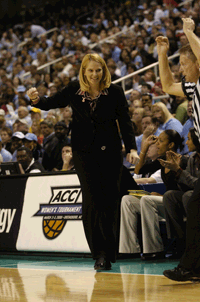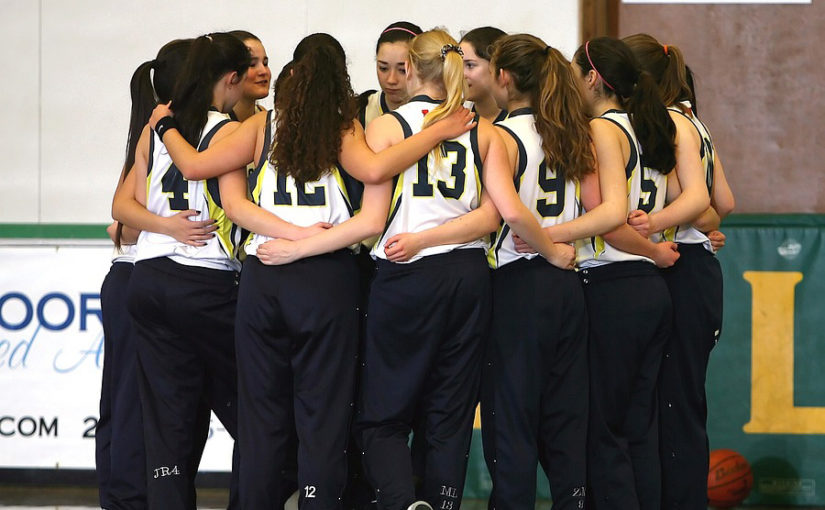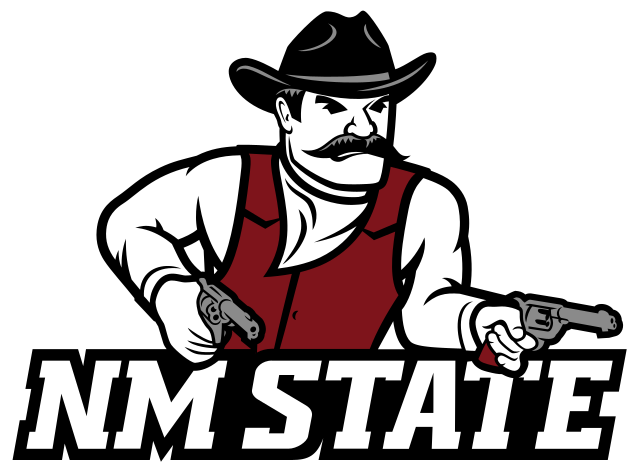Brenda Frese
Combining a dynamic personality, a dogged determination, and an infectious enthusiasm, Maryland’s Frese has arrived as an upper echelon coach.
Interview by Charlie Patton
COACH: How did growing up in Cedar Rapids develop your passion for basketball? The late 1980’s was clearly a good a time to play basketball in the region It spawned two other NCAA coaches who played against you in AAU ball: Katie Abrahamson-Henderson (Missouri St.), Shelley Sheetz (Pepperdine assistant).FRESE: I have to chuckle probably because there was nothing else to do. With the cold winters out in the Midwest you are forced to play inside. At that time there were just a lot of great teams and programs that were being developed with the AAU coaches. I was fortunate that I came from a family of six and my parents had us all involved in athletics.
 |
| Brenda Frese |
COACH: What role did your family play in your becoming a basketball player and coach?
FRESE: They pretty much had us involved with a lot of activities. From music to gymnastics to any kind of sports: basketball, swimming, volleyball, and softball. They just let us play and be kids. I remember at an early age being on a boys’ YMCA team and starting to have some success with basketball, where all of a sudden left-handed lay-ups were becoming easy. I could see that I was having success against my peers and that basketball was the sport for me and the one I had the most passion for. I then went on to play at Cedar Rapids (IA) Washington High School. Basketball and volleyball were my two main sports. But I also did one season each of track and softball.
COACH: Describe your athletic career at U. of Arizona? How did your time as a player influence you in your development as a coach?
FRESE: I actually had a different route as a player in college. I think I probably faced more adversity than success. I had a homesickness factor when I was a freshman, being 26 hours away from my home. I faced losing the head coach that had recruited me at Arizona. June Olkowski left and Joan Bonvicini took over, so I saw a transition with the coaching staff. I went through four-foot surgeries. I think it was that kind of adversity that probably helped prepare me to be a better coach. As players, you always think you’re going to play forever and you’re not prepared for your future. Once my career was ended with injuries – I didn’t play my last year – it really forced me to have to make a decision about my future sooner rather than later.
COACH: During your senior year, after a number of injuries, you began your coaching career working at Pima Community College in Tucson, AZ, as an assistant. What sparked the decision to begin coaching at such an early age?
FRESE: I initially thought I was going to keep playing forever, which is ironic and funny at the time because there was no women’s pro league in the U.S. I just knew that I still loved the game. I spent countless hours involved with it. My passion was there. When the opportunity to coach presented itself, I blindly jumped into it and immediately fell in love with every aspect of the game. It’s interesting because we would practice in the morning, because the head coach had another job, and I am not a morning person. But it was easy for me to get up for 6 a.m. practices because I just really loved the game.
COACH: Shortly after acquiring your masters in sports administration at Kent State you got a job as an assistant coach and recruiting coordinator at Iowa State. How did your time under coach Bill Fennally, in which your team was a top-25 force in the Big 12, shape your recruiting skills?
FRESE: I would say that probably the biggest impact on my coaching career was being able to learn and soak everything up from Coach Fennally, especially on the recruiting end in the Big 12 Conference; one of the toughest conferences in the country. We took over a rebuilding program. I took notice of his strategy, the way he recruited, and how he went about everything. It was just a perfect fit for me.
COACH: Taking over your first head-coaching job at Ball State provided your first challenge in trying to turn around a struggling team. You inherited a moribund program and immediately made an impact as the team went 35-22 in your two years. Your success earned you the first of many awards, the Mid-American Conference Coach of the Year. What were the major reasons for your initial success?
FRESE: Obviously being able to go there and change the mentality from losers to winners. It was important to build on the players we had. I really tried to utilize the strength that every player possessed and tried to incorporate it into the team concept.
COACH: Following your stint at Ball State, you had outstanding success in once-again turning around a losing program, Minnesota, which improved from 8-20 in the previous year to 22-8-one of the largest turnarounds in Big Ten and NCAA women’s basketball history. Not surprisingly, that year you were named NCAA and Big Ten Coach of the Year. Working with largely the same players, how did you reverse the losing mentality?
FRESE: Like anywhere you go, it’s just one day at a time, one practice at a time. You start early in terms of building your team for success in the preseason. You build them up through game situations. Everything is about how you deal with things in terms of how you handle losses, how you handle victories, and working on them each and every day.
COACH: What made you leave Minnesota for Maryland after only one year? What did you see in the Maryland program that convinced you that the Lady Terrapins were ready to become a powerhouse?
FRESE: There were a lot of factors. First and foremost was the vision of our athletic director, Debbie Yow. She was very instrumental in her leadership and we just really meshed, we were in sync. Maryland had been a powerhouse in the 1980s and I knew with the support, facilities, and the location, we had the ability that we needed to attract top-notch players to play for us in the ACC. I thought the combination of all of those factors presented us with a perfect fit to make it a nationally ranked program.
COACH: You’ve been credited as one of the best motivators in women’s college basketball. What are some of your successful techniques? How do you balance between criticizing a player for a lack of effort or a mental mistake while maintaining an overall positive attitude that instills the confidence necessary to win?
FRESE: When I do speak to our players, I speak from the heart. And I think that’s the biggest asset of my communication style: it’s honest and direct. When I motivate, I really try to build self-esteem and self-confidence. I’m not a tear down-type coach. When I am disappointed in players they’re going to know it, but they’re going to know it by the technique I use to let them know I am not happy with them because I believe in them and I believe they can do more.
COACH: Your first season at Maryland, 2002-03, didn’t match the success that you enjoyed in your first seasons at Minnesota and Ball State. How did you view the season’s failures and successes of that 10-19 season?
FRESE: I think I took more from the practice mode. You obviously aren’t going to see a lot of success with 10 wins in a game mode. We really built the future success from our practice habits, then becoming competitive in games. Not winning games. But just becoming more and more competitive to the point they weren’t lopsided losses and blowouts. We invested an enormous amount of time in recruiting quality student-athletes to Maryland.
COACH: After only four years at Maryland you won your first national championship and continue to bring in top recruiting classes. Did you expect this high a level of success when you first took the job?
FRESE: I came here to win a national championship but in my wildest dreams I didn’t think we would accomplish it that quickly. When you get everyone to buy into your belief system and be on the same page, there’s no better reward for a coach. There isn’t a timetable. I’ve learned that through my stints at Minnesota and Ball State. You don’t have to limit expectations. It’s exciting to build on this for the future.
COACH: Starting at Iowa State and continuing through Maryland, you’ve shown your skills as a remarkable recruiter, as the Lady Terps have had several top 10 recruiting classes. What do you look for in recruiting prospects and how do you convince these players to join in rebuilding a program?
FRESE: Besides the obvious of having the talent to play at this level I look at the competitiveness and heart of a player. Do they hate to lose? Will they be willing to invest the passion and time that it takes to become very successful?
It’s easier to recruit now that we have won a national championship and convince kids that they can become part of a dynasty. More importantly, when you come to Maryland you’re going to have the total experience. You’re going to have a great time. You’re going to work hard but you are going to enjoy every single moment of your four years on this team and on this campus.
COACH: Despite your team’s youth in the 2005 season, it displayed astounding resiliency in the face of adversity, such as a flu virus that hit much of the team including yourself. During the Elite 8, you overcame a 13-point deficit in the championship game, and your team had a sterling 6-0 record in OT games, many of them against ranked opponents. How have you been able to prepare your players to execute so well under such adversity and high-pressure situations?
FRESE: First, I think that shows you how special and unique that team was last season. It was actually a team that welcomed that kind of pressure and really thrived on it. When you look at 6-0 in overtime and all of those game being on the road, that’s kind of an unheard of statistic. It just shows the kind of character of the kids that we have recruited, what kind of people they are, and how they have been raised. When you have something special going that’s the kind of thing that can separate you as a team.
I think it is about connecting and being able to relate. I want the most confident, dominant team to line up from the tip. I don’t want there to be any inadequacies. You have enough drama, or I should say, pressure, in the game itself that I don’t want there to ever be any added pressure placed on our team and players through me.
COACH: Your 2005 NCAA Championship team led the nation in three-point shooting and was second in scoring only to Duke, what are some of the fundamentals you stress in your offensive philosophy?
FRESE: Being unselfish and making the extra pass. I think when you look at all five starters and the talent we had, averaging double-figures; we seldom ever took a tough shot we didn’t need to. We really played within the game and within the flow of what opportunities were given to each and everyone of them.
We are an up-tempo team, being second in the country in scoring. I thought our team really bought into the fact of what was working. If the opposition couldn’t stop us inside, we’d go inside. If we were hot from the outside, we’d stick with the three. Everyone knows they have the green light to shoot. They understand that there’s a lot of freedom within our offense for players to create.
COACH: Of course, your teams don’t win with just offense. What defensive philosophies do you teach your players?
FRESE: It’s actually changed. But we prefer to get up in our half-court defense and attack man-to-man, being aggressive with our ball pressure and wing denial.
COACH: The Atlantic Coast Conference boasted three of the final four teams last season, as both Duke and North Carolina also made it. In what ways does playing in such a talented and competitive conference help your team prepare for the post-season?
FRESE: It’s huge because you have been in those battles and wars in January and February. When you put that kind of time and work into it, you know in March and April that you have the confidence to play in those kinds of games and situations. It definitely prepares you for the NCAA Tournament.
COACH: What are some facets of your job that you find most difficult? Are there any parts of your coaching style that you feel need improvement?
FRESE: I would say that the hardest thing for me to improve on is saying, no. Especially given our national championship. I want to be able to deal with every request that comes my way. I have the kind of personality to say yes to everyone and I can’t.
As a coach, you always want to keep improving on the court and putting your team in the best situations more constantly: tweaking our offensive sets and out-of-bounds plays and what makes the most sense based on the strengths and weaknesses of our team.
Coaching is obviously an all-consuming job. You have very few weekends and you need to find a way to have a sense of balance. It’s easy to lose that perspective. It’s easy to throw yourself into the job because I love doing it. But I also know that I am better and fresher when I am sometimes able to get away from it and come back with a clean slate.
COACH: Division I-A athletics often struggle in promoting scholastic success along with athletic prowess. How do you manage balancing athletics and academics with your players?
FRESE: Our No. 1 priority is academics. So it’s stressed over and over in our huddles, during practice, in the locker room, and after games. We make it a priority in the sense that if someone is not doing well or holding up their end from an academic front, they don’t practice and they miss games.
COACH: How has the long winning tradition with Gary Williams and the Maryland men’s basketball team helped you in jumpstarting the women’s team?
FRESE: Gary and I have a tremendous relationship. It was really huge when we came to College Park on the heels of the men’s national championship. It opened up a lot of doors for us, getting on the phone with recruits just after they won the title. He’s been nothing but supportive with our team and for our program.
COACH: What advice could you give for up and coming coaches in turning around and developing programs?
FRESE: The two P’s: Be patient and be positive. Because in most cases, you’re not going to turn around a program overnight. You have to be patient in the process daily. You can’t jump ahead. You can’t miss steps. When you first come to a program you have to change the image and the mentality. And that takes times. You do that by who you are and how you treat your staff, the support staff, the organization, and the players. If you follow that plan it definitely pays off in the end.












